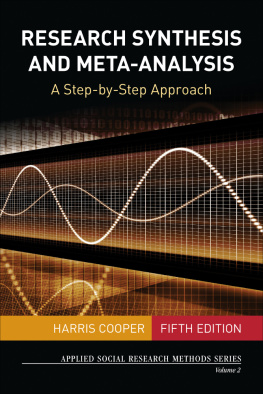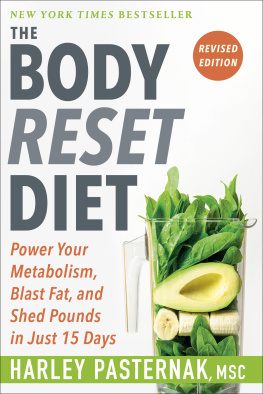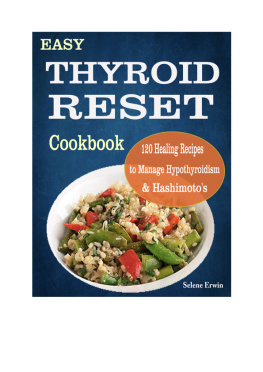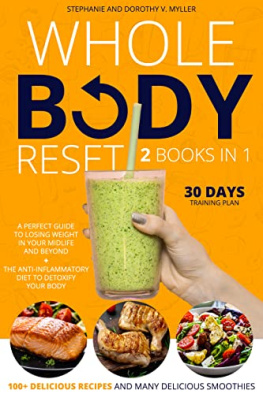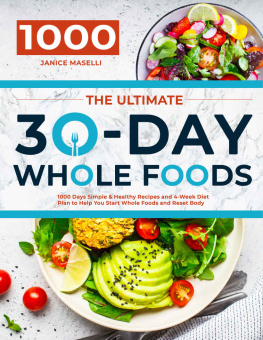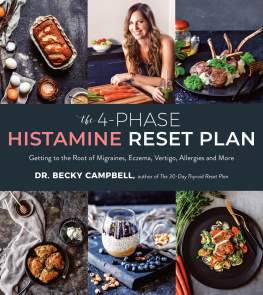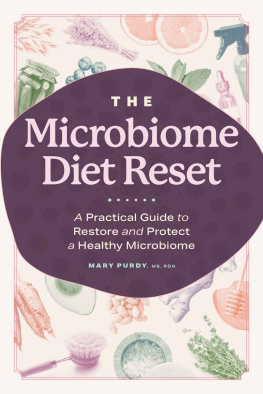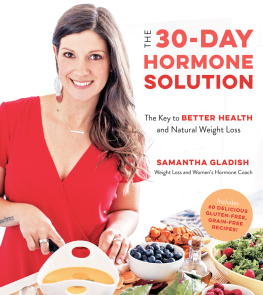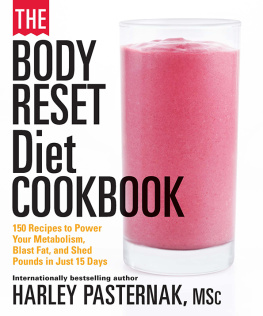The Whole Body Reset Diet Cookbook
toc
Contents
INTRODUCTION
Your muscle mass declines and your fat mass rises as you get older. Muscle is more metabolically active than fat, so maintaining muscle requires more calories than maintaining fat. Loss of muscle mass and more of fat mass slows down metabolism with ageing and it leads to more weight gain and obesity. People crossing 50 are more susceptible to such weight gain and it be countered through a dietary approach first presented by Stephen Perrine which is popular as the Whole body reset diet. The purpose of this diet is increase the protein consumption and reduce the intake of unhealthy fats to help build more muscles and remove fats. Perrine has come with a comprehensive weight loss plan which is not healthy and nutritious for all.
In this cookbook, while I will explain this whole approach in more detail I will also share several delicious and healthy recipes that will help you incorporate this diet plan into your daily routine. What is a Whole Body Reset? You can pause and even revert age-related weight gain and muscle loss with the first-ever tried-and-tested, science-based weight-reduction program developed to shrink your belly, lengthen your life, and help you become your healthiest self in midlife and beyond. The proponents of this diet make this simple and valid argument that as we age, traditional food and exercise cease to be effective for us and that, instead, little dietary adjustments can prevent and even reverse age-related muscle loss and weight gain. Essentially, the reset calls for eating three meals per day that each have 30 grams of protein and 5 grams of fibre, as well as one or two snacks that each contain 7 grams protein and 2 grams fibre. Additionally, fruits, vegetables, nuts, and dairy products should be included in meals (for me, pea milk; you can be lactose-free, gluten-free, even vegan or vegetarian on this plan). Generally speaking, simply being more conscious of what you are putting into your body will help you become leaner, more energetic, and more mentally alert.
Stephen Perrine worked as an author, editor, or publisher on more than twenty New York Times bestsellers, including the Eat This, Not That! Series. Nutritionist and exercise physiologist Heidi Skolnik who has appeared on a number of major television programs. Together they developed the whole body Reset diet together. The Whole Body Reset, in their opinion, reveals shocking new evidence that contradicts conventional wisdom, debunks the myth of slow metabolisms and "inevitable" weight gain, and alters how people in their mid-forties and older should perceive eating. This study demonstrates the effectiveness of "protein timing" for midlife adults. The advocates of this diet describe how eating a diet high in protein can help us respond to exercise as if we were 20- 30 years younger and how ageing causes our bodies to change.
Science Behind the Whole body Reset Diet We long believed that gaining weight in middle age was caused by a decline in metabolism, or more precisely, what scientists refer to as resting metabolic rate (RMR), which is the amount of energy body needs to perform basic metabolic functions. Our individual cells, however, continue to work about at the same rate in our 40s and 50s as they did in our 20s, according to a study. Our metabolic rate actually doesn't start to slow down until we are about 60 years old, and even then, it only slows down at a rate of.07 percent every year. Therefore, the growing waistline you've experienced or the difference between your present and 20s-era bodies is not due to metabolism. The quantity of protein you eat and the amount of exercise you get are two things you can really manage. The kind and quantity of protein you ingest as you become older, in accordance with the whole body reset, makes all the difference.
A younger person can get the same amount of protein from only a few eggs as an older person can from at least 25 to 30 grams at a time, according to studies. The human body constantly breaks down proteins and rebuilds muscle. However, when long-term muscle deterioration outpaces long-term muscle restoration, muscular tissue progressively starts to vanish. Studies show that older adults are more prone to lose muscle throughout the day if they don't eat 25 to 30 grams of protein in the morning. Between the ages of 30 and 40, adults begin to lose between 3 and 8 percent of their muscle mass per decade. As we age, we gain more fat and less muscle.
Muscle helps to regulate blood sugar levels and burns more calories overall. Less muscle mass causes your blood sugar to rise, which forces your body to convert more of the blood sugar into fat. Because of this, a weakened immune system, diabetes, cancer, heart disease, and all of the other diseases listed above have been linked to muscle loss. Because of this, the whole body reset diet advises that as people age, they should consume more protein to maintain blood sugar management, build muscle, and prevent obesity and other problems associated with weight gain. A high protein diet must be combined with resistance training to hasten the body's process of creating muscle. Additionally, it aids in calorie and belly fat burning, which is the most effective method for weight loss.
The Advantages Of Whole Body Reset Poor dietary habits, low metabolism, and an inactive lifestyle; there are several causes of weight gain, and you can blame any, but to counter them, all you need is a whole-body reset. In today's world, we all are inclined to eat processed, unhealthy food, work late hours, and stay sleep deprived with little to no regular exercise, and that cannot change unless we press that "reset" button and start making healthier choices. And that's what the whole body reset program is all about; it gives you the kick start that you need to lose weight and become healthy as you want to be. It has proven to be a life-changer for me, and if you follow it as per the given guidelines, you can too achieve good results. There are other benefits that make this diet plan a must-try, in addition to weight loss, that you will enjoy thanks to the excellence of this dietary program. I'll only mention a handful: Protein Timing Timing your protein intake or consuming the proper amounts of protein throughout the day is the key to preventing weight gain at a later age.
As a result, ageing bodies avoid storing fat and preserve lean muscular mass. This approach, along with a wealth of vitamins, minerals, fibre, and healthy fats, can help older people change not only their bodies but also their lives. Add fiber, fruit, and veggies to the diet: The diet encourages the consumption of fruits and vegetables, which is good for increasing fibre intake. Smoothies are excellent for adding a lot of fiber-rich fruits and vegetables. They make it easier for people to consume enough fruit and fibre in their regular diet who may otherwise find it challenging. Keeps you Motivated Despite the fact that 21 days is a short period of time, whatever weight you lose during this time may push you to stick with the Whole Body Reset Diet for longer.
This is because early rapid weight loss and long-term diet success are related. On the other side, higher rates of weight loss program dropout are associated with lower early weight reduction. Researchers speculate that this gap may be caused by low levels of motivation. Simply put, if people experience rapid benefits, they may be more motivated to continue the program because they believe it works. Simple to Follow: There is some nutritional control involved with the Whole Body Reset diet. The diet blueprint offers advice on how to meet the requirement of eating more than 30 grams of protein every meal.
Compared to other weight loss strategies you may have heard of, this diet offers the most straightforward meal plans with fewer restrictions. Increased Metabolic Rate If you eat more protein, you might be able to burn more calories. Protein digestion appears to increase metabolic rate by an astounding 20-35 percent, in contrast to the 5-15 percent increase in metabolic rate generated by digesting carbohydrates or fat. In fact, numerous studies have shown that eating a protein-rich meal increases calorie expenditure for several hours thereafter. After meals, the metabolic rate is increased by nearly twice as much on a high-protein diet for one day as it is on a high-carb diet. Loss of Weight and Body Composition It is not surprising that protein's ability to increase metabolism, improve fullness, and decrease hunger can help with weight loss.
Next page



